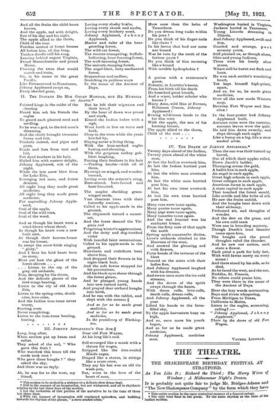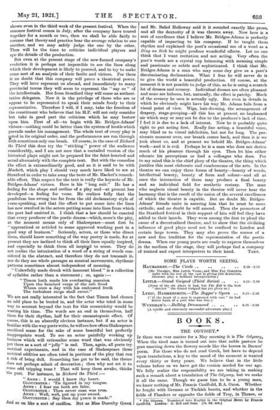THE THEATRE.
`171-11, SHAKESPEARE BIRTHDAY FESTIVAL AT STRATFORD.
As You Like It ; Richard the Third ; The Merry Wives Windsor ; A Midsummer Night's Dream.
IT is probably not quite fair to judge Mr. Bridges-Adams and "The New Shakespeare Company" by the form which they have • This entire section In the open oratorical manner of a funeral eulogy. In d t The only loud lines in the poem. To the same rhythm as the close of the Indian section.
of shown even in the third week of the present festival. When the summer festival comes in July, after the company have toured
together for a month or two, then we shall be able fairly to
assume that theory and practice bear the average relation to one another, and we may safely judge the one by the other.
Then will be the time to criticize individual players and specific details of the production.
But even at the present stage of the new-formed company's evolution it is perhaps not impossible to see the lines along which their development is likely to proceed, and to try to make some sort of an analysis of their faults and virtues. For there
is no doubt that this company will prove a theatrical power. They will later represent us abroad, and immediately to many provincial towns they will seem to represent the " say so " of the intellectuals. Hot from Stratford they will come as authori-
tative delegates. Now it is the privilege of those who are or appear to be represented to speak their minds freely to their representative. Therefore I will, if I may, take the freedom of the constituent who believes that his M.P. will not only consider but take in good part the criticism which he may bestow upon him. First of all—to begin with Mr. Bridges-Adams' virtues—nothing could be better than the system of hustle which prevails under his management. The whole text of every play is
in its original order, and the performances are run through with sometimes only one break. Of course, in the case of Richard the Third this does try the " sticking" power of the audience considerably, and I am not sure that a curtailed version of the historical plays might not he prepared for the faint-hearted and acted alternately with the complete text. But with the comedies the effect is extraordinarily good, and so it is said to be with Macbeth, which play I should very much have liked to see at
Stratford in order to take away the taste of Mr. Hacket's remark- able effort. This respect for the text is really the keynote of Mr. Bridges-Adams' virtues. Here is his " long suit." He has a feeling for the shape and outline of a play and—at present less developed—a feeling for verse. He realizes fully that the pendulum has swung too far from the old declamatory style of verse-speaking, and that the effort to put sense into the lines has now resulted in the actors putting sense into lines from which
the poet had omitted it. I think that a law should be enacted that every producer of the poetic drama—which, more's the pity,
at the moment means only of Shakespeare—must first be " apprenticed or articled to some approved working poet in a good way of business." Seriously, actors, or those who direct them, should luow something of the way poetry is made, for at present they are inclined to think all their lines equally inspired, and especially to think them all inspire to sense. They do not realize the intoxication of a word of a string of words con- sidered in the abstract, and therefore they do not transmit it, nor do they see whole passages as musical movements, rhythmic patterns sometimes almost independent of meaning.
" Unlawfully made drunk with innocent blood " is a collection of syllables rather than a statement ; or, again :— " Timon hath made his everlasting mansion Upon the beached verge of the salt flood Whom once a day with his embossed froth The turbulent surge shall cover."
We are not really interested in the fact that Timon had chosen an odd place to be buried in, and the actor who tried in some way to account beyond the text for this eccentricity would be wasting his time. The words are an end in themselves, half there for their rhythm, half for their onomatopoeic effect. Of course, this is an absurdly obvious instance, but if an actor is familiar with the way poets write, he will see how often Shakespeare sacrificed sense for the sake of some beautiful but perfectly inappropriate word. To see an actor painfully working up business which will rationalize some word that was obviously put there as a sort of " jolly" is sad. Then, again, all poets try metrical experiments, and in the case of Shakespeare these
metrical oddities are often tried in portions of the play that run a risk of being dulL Something has got to be said, the theme does not perhaps admit of decoration ; then why not set it to some odd tripping time I' That will keep them awake, thinks the poet. For instance, in Richard the Third :- "ANNE: I would I knew thy heart. GLOUCESTER : 'Tis figured in my tongue. ANNE : I fear me both are false.
GLOUCESTER : Then never man was true. ANNE : Well, well, put up your sword. GLOUCESTER. : Bay then my peace is made."
And so on like a sort of carillon. But as Miss Dorothy Green and Mr. Baliol Holloway said it it sounded exactly like prose, and all the dexterity of it was thrown away. Now here is a sort of excellence that I believe Mr. Bridges-Adams is perfectly capable of imparting to his company. If he taught them rhythm and explained the poet's occasional use of a word as a Ding an Bich he might produce wonderful effects. Let no one think that I want recitation and not acting. Very often the poet's words are a crystal cup brimming with meaning simple and passionate or subtle and sophisticated. I think that Mr. Bridges-Adams is a man who may some day give us a poet's discriminating declamation. What I fear he will never do is to give the world a beautiful production. Of course, at the moment it is not possible to judge of this, as he is using a scratch lot of dresses and scenery. Individual dresses are often pleasant and none are hideous, but, naturally, the effect is patchy. Much of the scenery he uses is actually ugly. But even in details in which he obviously might have his way Mr. Adams fails from a visual point of view. Wigs, hair-dressing, the arrangement of drapery, stage-grouping—all this has at present an haphazard air which may or may not be due to the producer's lack of time. I feel it is due to a lack of interest. Now he is probably quite right to put acting first. Really fine acting, a beautiful voice, may blind us to visual infelicities, but not for long. The pas- sionate moment over, our breath comes back, and then it is we look about us, and at present we behold Mr. Bridges-Adams' work—and it is evil. Perhaps he is a man who does not derive much of his pleasure through his eyes. Then let him either educate his perceptions or find a colleague who does. For to my mind this is the chief glory of the theatre, the thing which justifies this most elaborate and cumbersome of the arts. In the theatre we can enjoy three forms of beauty—beauty of words, intellectual beauty, beauty of form and colour—and all at once the interaction of these may produce a final beauty and an individual field for aesthetic ecstasy. The man who neglects visual beauty in the theatre will never hear the harmony that is the result of the union of the several excellences of which the theatre is capable. But no doubt Mr. Bridges- Adams' friends unite in assuring him that he must be more catholic, and no doubt he will amend. Then the promoters of the Stratford festival in their support of him will feel they have added to their laurels. They were among the first to plead the cause of a decentralized theatre, and to show that the civilizing influence of good plays need not be confined to London and certain large towns. They may also prove the nurses of a new and fine tradition for the representation of the poetic drama. When our young poets are ready to express themselves in the medium of the stage, they will perhaps find a company
of trained and expert interpreters to their hand. Tette.



































 Previous page
Previous page